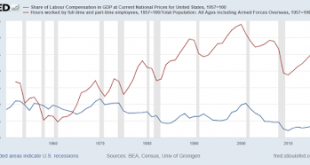by Ken Melvin The Road to Calvary From: What to Think To: What to Believe From 15 to 30mins of TV Evening News in 1970 to 24hr TV News in 1980; then on to Fox News in 1996. From the 1950s print journalists and radio news broadcasts, to TV Evening News, to 24hr TV telegenic news readers, to Fox News, to Donald Trump. From the trusted Cronkite, and Huntley – Brinkley nightly news, to cable 24hr CNN opining/news, to Fox News (the most-watched cable news)...
Read More »Tip of the Iceberg
by Ken Melvin (reader Ken Melvin offers more on climate change) Tip of the Iceberg Around the world, the poorest live on marginal land. Land where, whether due the shortness of the growing season, frequent flooding, lack of moisture, poor quality of the soil, temperatures, altitude …, it is difficult for them, even in the good times, to eke out a living. (The history of how is it that they come to live on these lands is the stuff of anthropology.) These...
Read More »Debt, wealth and climate: globally coordinated Climate Authorities for green financing
By T.Sabri Öncü & Ahmet Öncü This article first appeared in the Indian journal, Economic and Political Weekly on 18 April 2020. The authors’ contact details are at he foot of this article.Abstract Based on the German Currency Reform of 1948 and the “Modern Debt Jubilee” of Steve Keen, a globally coordinated orderly debt deleveraging mechanism is proposed to address the global debt overhang problem. Since the global debt overhang and lack of sufficient climate finance...
Read More »Meanwhile…climate change
(Dan here…I know its long, broad, … but I think it says somethings that need be said. Another look??) by reader Ken Melvin The Anthropocene and Global Warming Anthropocene: geological epoch dating from the commencement of significant human impact on Earth’s geology and ecosystems. Someday, anthropologists and historians will look again at the possible causes of Global Warming. That it was Anthropogenic has long since been recognized, but let them ask...
Read More »Here’s a Three-Step Plan to Take Back Control
The following article appeared on The Correspondent’s website on 17 April, 2020 With acknowledgement to HiltonT for the image of the President Steyn Gold Mine in Welkom, Orange Free State. I was born and grew up in a dusty, sparsely populated gold mining town on the bare and vast ‘veld’ of the Orange Free State, South Africa. As a child, my town’s dependence on the extraction of gold at a price fixed in Washington, opened my eyes to the architecture of the international...
Read More »From Social Distance to Social Justice: An Unsolved Riddle
In the last two weeks of March and the first week of April, 2020 16.5 million new claims for unemployment were filed in the U.S. After the novel coronavirus is successfully contained some but not all of those jobs will return. The post-pandemic economy will not be the same as the economy before and to assume a return to business-as-usual economic growth would be folly. There will need to be immediate share-the-work policies along with basic income...
Read More »The superiority of stay at home orders vs. voluntary social distancing: two graphic proofs
The superiority of stay at home orders vs. voluntary social distancing: two graphic proofs Here are a couple of graphs I pulled last week that I’ve been meaning to post. Together they show that mandatory “stay at home” orders have been much more effective than voluntary social distancing. First, here is a graph of the “change in distance traveled” by county during March: While almost all counties showed a sharp decline in the average distance travelled...
Read More »Atlanta and downstream friends
(Dan here…another of David Zetland’s students Johanna writes on groundwater…a reminder of what also matters during this heated political climate, and from a younger generation. The first mention of water wars at AB was 2007 I believe.) Atlanta and downstream friends Johanna writes* This post offers some insight into the problems of water management in Atlanta (the capital of Georgia) and the effects of those problems on its downstream neighbors Florida...
Read More »How to roast the planet with good intentions: The Climate Equity Act
I have suggested (here and here) that idealism is leading progressives astray. Unfortunately, climate policy offers many examples. Consider the Climate Equity Act of 2019. The CEA was, I believe, the first concrete piece of legislation proposed as part of the Green New Deal. Unfortunately, it illustrates several of the problems with progressive idealism. The CEA is moralistic rather than strategic. It does not take policy analysis seriously; it...
Read More »Follow the Real Money Behind the New Green Agenda — F. William Engdahl
What is becoming clearer is that the latest global push for dramatic climate action is more about justifying a major reorganization of the global economy, that to a far less efficient energy mode, implying a drastic lowering of global living standards. In 2010 the head of Working Group 3 of the UN Intergovernmental Panel on Climate Change, Dr Otmar Edenhofer, told an interviewer, ” … one must say clearly that we redistribute de facto the world’s wealth by climate policy. One has to free...
Read More » Heterodox
Heterodox



